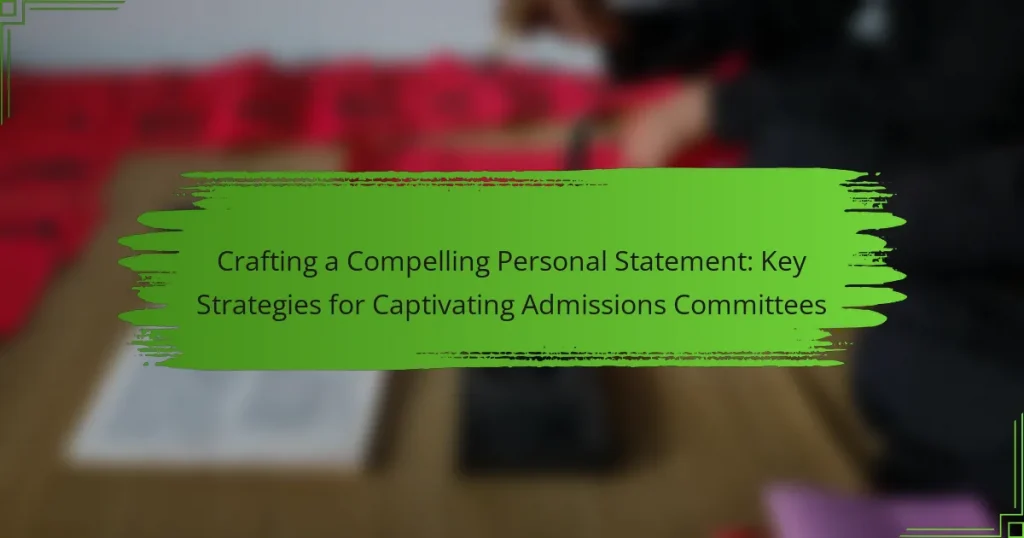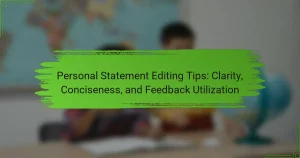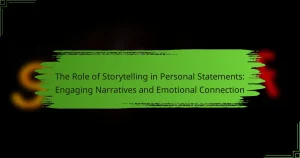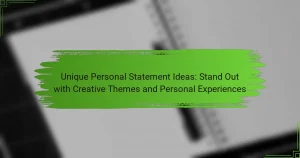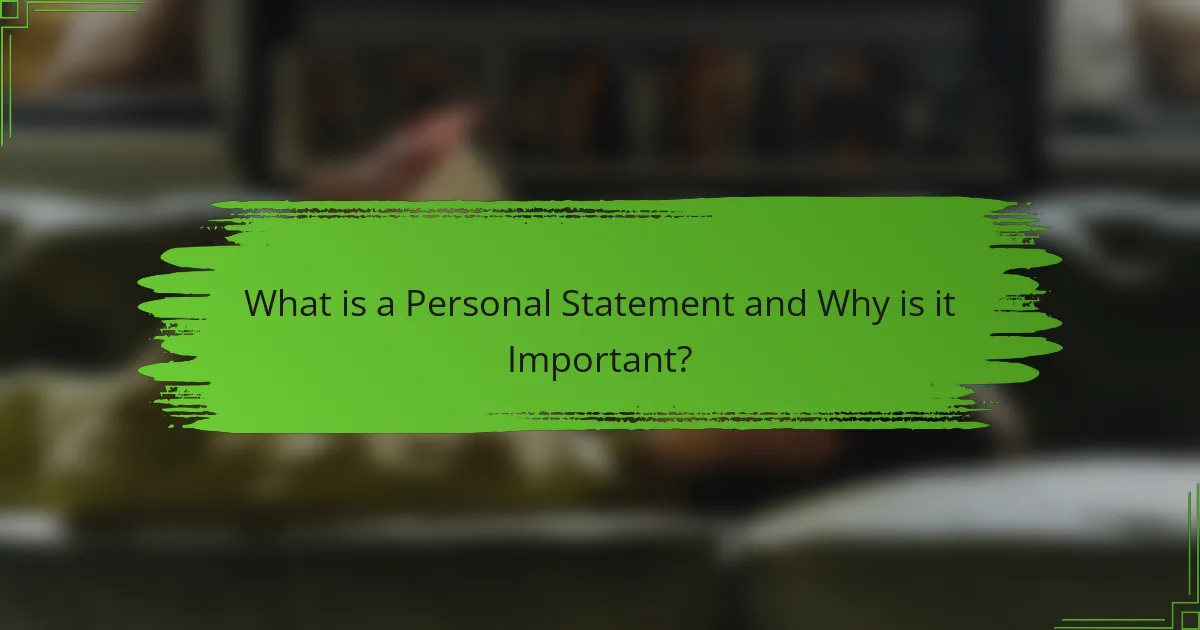
What is a Personal Statement and Why is it Important?
A personal statement is a written document that outlines an individual’s experiences, goals, and motivations. It is typically required for college or university applications. The importance of a personal statement lies in its ability to showcase an applicant’s unique qualities. Admissions committees use it to assess an applicant’s fit for their programs. A well-crafted personal statement can differentiate candidates in a competitive field. It provides insight into the applicant’s personality beyond grades and test scores. Moreover, it allows applicants to articulate their aspirations and commitment to their chosen field. Ultimately, a strong personal statement can significantly influence admissions decisions.
How does a personal statement influence admissions decisions?
A personal statement significantly influences admissions decisions by providing insights into an applicant’s character and motivations. It allows candidates to showcase their unique experiences and perspectives. Admissions committees use personal statements to assess an applicant’s fit for the program. A well-crafted personal statement can distinguish an applicant in a competitive pool. Research shows that 70% of admissions officers consider personal statements as a critical factor in their decision-making process. This highlights the importance of articulating one’s goals and aspirations effectively. Personal statements also reflect writing skills and critical thinking abilities, which are essential for academic success. Overall, they play a pivotal role in shaping perceptions of the applicant.
What key attributes do admissions committees look for in a personal statement?
Admissions committees look for authenticity, clarity, and relevance in a personal statement. Authenticity reflects the applicant’s true self and unique experiences. Clarity ensures that the message is communicated effectively without ambiguity. Relevance connects the applicant’s experiences and goals to the program they are applying for. Additionally, committees value self-awareness, which shows the applicant’s understanding of their strengths and weaknesses. Strong writing skills are also essential, demonstrating the applicant’s ability to articulate thoughts coherently. Finally, a compelling narrative can engage the reader, making the statement memorable.
Why is a personal statement considered a critical component of the application process?
A personal statement is considered a critical component of the application process because it allows applicants to showcase their individuality. This document provides insight into the applicant’s motivations, experiences, and goals. Admissions committees use personal statements to assess an applicant’s fit for the program. It distinguishes candidates beyond grades and test scores. A well-crafted personal statement can highlight unique perspectives and life experiences. It serves as a narrative that connects the applicant’s past to their future aspirations. Research shows that personal statements significantly influence admission decisions. According to a study by the National Association for College Admission Counseling, 47% of colleges consider essays and personal statements as a very important factor in admissions.
What are the essential elements of a compelling personal statement?
A compelling personal statement includes a clear purpose, personal anecdotes, and reflection. The purpose outlines the applicant’s goals and motivations. Personal anecdotes provide specific examples of experiences that shaped the applicant. Reflection connects these experiences to the applicant’s aspirations. Additionally, a compelling personal statement demonstrates authenticity and a unique voice. It should be well-structured, with a strong introduction and conclusion. Clarity and conciseness enhance readability. Finally, attention to grammar and style is essential for professionalism.
How can personal experiences enhance the narrative of a personal statement?
Personal experiences enhance the narrative of a personal statement by providing authenticity and relatability. They allow the applicant to illustrate their unique journey and personal growth. Specific anecdotes can demonstrate resilience, motivation, and passion. These stories can set an applicant apart from others with similar qualifications. Personal experiences help convey values and beliefs that resonate with admissions committees. They create an emotional connection, making the statement memorable. Research indicates that narratives rooted in personal experience are more engaging and persuasive. This approach aligns with the goal of showcasing individuality in a competitive application process.
What role does authenticity play in crafting a personal statement?
Authenticity is crucial in crafting a personal statement. It establishes a genuine connection with the reader. Authentic statements reflect the true experiences and values of the writer. This honesty allows admissions committees to understand the applicant’s unique perspective. A study by the National Association for College Admission Counseling indicates that authenticity significantly influences admissions decisions. Applicants who convey their true selves are often viewed more favorably. Authenticity also enhances the overall narrative of the personal statement. It differentiates the applicant from others with similar qualifications.

What Strategies Can Enhance Your Personal Statement?
To enhance your personal statement, focus on clarity and authenticity. Start by clearly articulating your goals and motivations. Use specific examples to illustrate your experiences and achievements. Show how these experiences shaped your aspirations. Tailor your statement to the program or institution by aligning your values with theirs. Maintain a professional tone while allowing your personality to shine through. Proofread for grammar and coherence to ensure a polished final draft. Engaging storytelling can also captivate the reader’s attention effectively.
How can you effectively structure your personal statement?
To effectively structure your personal statement, begin with a strong introduction. This should capture attention and outline your main themes. Next, develop the body with distinct paragraphs. Each paragraph should focus on a specific experience or quality. Use concrete examples to illustrate your points. Transition smoothly between paragraphs to maintain flow. Conclude by summarizing your key messages and reiterating your goals. A well-structured personal statement enhances clarity and impact, making it easier for admissions committees to understand your narrative.
What are the best practices for organizing your thoughts in a personal statement?
Begin with a clear outline to organize your personal statement. Identify key themes that reflect your experiences and goals. Use a chronological structure to present your journey logically. Start with a strong introduction that captures attention. Follow with body paragraphs that expand on each theme or experience. Use specific examples to illustrate your points clearly. Conclude with a summary that reinforces your main message. This structured approach enhances clarity and coherence.
How can a clear introduction and conclusion improve your statement?
A clear introduction and conclusion enhance your statement by providing structure and clarity. The introduction sets the tone and captures the reader’s attention. It outlines the main themes and establishes the context. A well-crafted conclusion reinforces the key points made throughout the statement. It leaves a lasting impression and ties together the narrative. Research indicates that effective introductions and conclusions increase engagement. According to a study by the University of Southern California, well-structured essays are rated higher by evaluators. This demonstrates the importance of clarity in academic writing.
What techniques can help you engage your reader?
Techniques to engage your reader include storytelling, asking questions, and using vivid imagery. Storytelling captivates the audience through relatable experiences. It creates an emotional connection, making the content memorable. Asking questions encourages readers to think critically about the topic. This technique fosters interaction, prompting deeper engagement. Using vivid imagery paints a picture in the reader’s mind. Descriptive language enhances understanding and keeps the reader interested. These techniques are effective in maintaining attention and enhancing the overall reading experience.
How can storytelling be used to captivate admissions committees?
Storytelling can captivate admissions committees by creating an emotional connection. Personal narratives allow applicants to showcase their unique experiences. These stories provide context to achievements and challenges faced. A well-crafted story highlights personal growth and resilience. It also demonstrates the applicant’s values and motivations. Engaging storytelling makes applications memorable. Research shows that emotional engagement enhances retention of information. Admissions committees are more likely to remember compelling narratives compared to mere facts.
What are the benefits of using vivid language and imagery in your writing?
Using vivid language and imagery enhances writing by making it more engaging and memorable. This technique captures the reader’s attention and evokes emotions. Engaged readers are more likely to connect with the content. Research indicates that imagery can improve comprehension and retention of information. A study by the University of California found that descriptive language increases a reader’s ability to recall details. Additionally, vivid imagery can create a stronger mental picture, leading to a deeper understanding of the narrative. Overall, using vivid language and imagery significantly boosts the impact of writing.

What Common Mistakes Should You Avoid in Your Personal Statement?
Common mistakes to avoid in your personal statement include vague language, lack of focus, and excessive length. Vague language can make your statement unclear and unmemorable. Admissions committees prefer specific examples that showcase your achievements and experiences. Lack of focus can lead to a disorganized narrative. Each paragraph should support a central theme or message. Excessive length can dilute your main points. Most personal statements should be concise, typically around 500-750 words. Additionally, failing to proofread can result in grammar and spelling errors. Such mistakes can give the impression of carelessness. Lastly, not adhering to guidelines can disqualify your submission. Always check word limits and formatting requirements.
What pitfalls can detract from the effectiveness of your personal statement?
Common pitfalls that can detract from the effectiveness of your personal statement include lack of focus, generic content, and poor grammar. A personal statement should have a clear theme or message. Without focus, the reader may struggle to understand your main point. Generic content fails to showcase your unique experiences and qualities. Admissions committees seek individuality, so avoid clichés and overused phrases. Poor grammar and spelling errors can undermine your credibility. These mistakes suggest a lack of attention to detail, which is crucial in academic settings. Additionally, being overly verbose can obscure your message. Conciseness helps maintain the reader’s interest and clarity. Lastly, failing to address the prompt directly can lead to disqualification. Always ensure your statement aligns with the specific requirements of the application.
How can clichés undermine the originality of your statement?
Clichés can undermine the originality of your statement by making it sound generic. When a statement relies on overused phrases, it loses its unique voice. Admissions committees often read many applications. They can quickly identify clichés and may perceive the applicant as unoriginal. This perception can diminish the impact of the personal statement. Originality is crucial in standing out among numerous candidates. A statement rich in personal insights and specific experiences is more compelling. Therefore, avoiding clichés is essential for a strong, memorable personal statement.
What are the consequences of grammatical errors and poor formatting?
Grammatical errors and poor formatting can significantly undermine the effectiveness of a personal statement. These mistakes can lead to misunderstandings of the applicant’s message. Admissions committees may perceive grammatical errors as a lack of attention to detail. Poor formatting can make the statement difficult to read, causing reviewers to miss key points. Research indicates that clear and polished writing enhances perceived credibility. A study by the National Association of Colleges and Employers found that effective communication is a top skill sought by employers. Therefore, such errors can diminish an applicant’s chances of making a positive impression.
What final tips can help you craft a standout personal statement?
To craft a standout personal statement, focus on authenticity and clarity. Be genuine in expressing your motivations and aspirations. Use a clear structure to guide the reader through your narrative. Start with a compelling introduction that grabs attention. Highlight key experiences that shaped your journey. Use specific examples to illustrate your points. Keep your language concise and free from jargon. Finally, revise multiple times to ensure clarity and coherence. These strategies enhance the effectiveness of your personal statement.
How can seeking feedback from peers or mentors enhance your personal statement?
Seeking feedback from peers or mentors can significantly enhance your personal statement. Feedback provides an external perspective on clarity and coherence. Peers may identify areas that are confusing or unclear. Mentors can offer insights based on their experience in admissions. Constructive criticism helps refine your message and tone. It can also highlight strengths you may overlook. Additionally, feedback can reveal any biases or assumptions in your writing. Overall, seeking feedback leads to a more polished and effective personal statement.
What are the best practices for revising and editing your personal statement?
The best practices for revising and editing your personal statement include multiple steps. First, take a break after writing to gain perspective. This helps identify areas needing improvement. Next, read your statement aloud. This reveals awkward phrasing and unclear ideas. Then, seek feedback from trusted peers or mentors. They can provide valuable insights and suggestions. Additionally, focus on clarity and conciseness. Remove redundant phrases and ensure each sentence serves a purpose. Finally, proofread for grammar and spelling errors. These mistakes can undermine your professionalism. Following these practices can enhance the quality of your personal statement significantly.
The main entity of the article is the personal statement, a crucial document required for college or university applications that outlines an individual’s experiences, goals, and motivations. The article provides comprehensive strategies for crafting a compelling personal statement, emphasizing the importance of authenticity, clarity, and structure to engage admissions committees effectively. It discusses key attributes sought by admissions committees, essential elements of a strong personal statement, common mistakes to avoid, and best practices for revision and feedback. By focusing on storytelling and vivid language, applicants can enhance their narratives and improve their chances of making a positive impression in a competitive admissions landscape.
